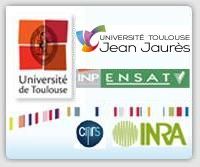
Professional and research aims of the Master course
The Master’s program trains students to become more than technical spatial-data operators by including high-level management courses: project management, spatial implication analysis and by proposing conferences by experts, tutored projects and a long final internship.
The Master is supported by a university department of geography and an agronomic engineering school, within the Toulouse University institution. This program is intended for students and professionals already skilled in an applied domain (agronomy, spatial planning, geography, management, computer science, life and earth sciences, urbanism, etc.) to whom the proficiency with georeferenced information brings a decisive asset to find their first job or develop their professional career. The large diversity of students’ origins is one of the asset of the Sigma Master course.
The geomatics specialization is structured around several strong points:
- A teaching approach combining technical excellence with a wise an thoughtful use of the tools, the knowledge of the application issues, integrated in a project management framework;
- An in-depth teaching of the core concepts, bases and techniques of GIS (geographical information systems), and, more generally, digital spatial information. This teaching is completes those of the first year of the master courses and is based on the possible applications in spatial planning and environmental management. These applications are developed in case studies by professionals of the field;
- A special place is reserved for basic computer science skills (system architecture, algorithms and development, object approach, database engineering…);
- A large portion of the curriculum is dedicated to applied subjects and project management, within the taught period (via the conferences and workshops with professionals), the project period (five weeks of group work) and the internship (4-6 month);
- The huge time devoted to computer activities and the use of standard commercially-available systems and software in GIS and image analysis.
Since more than 15 years, the Sigma master course has provided the students with a quick and well-adapted labor market integration, as well as research positions.
The quality of the academic training has been acknowledged by the highest award - AERES (Agence d'Evaluation de la Recherche et de l'Enseignement Supérieur), 2010.
The creation of the "geomatics as a research subject" course in 2011 has reinforced the place of research in the curriculum.

